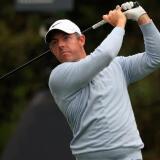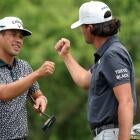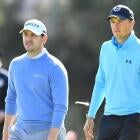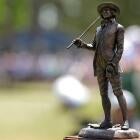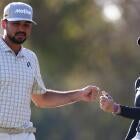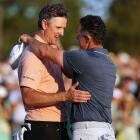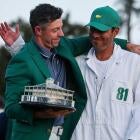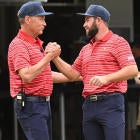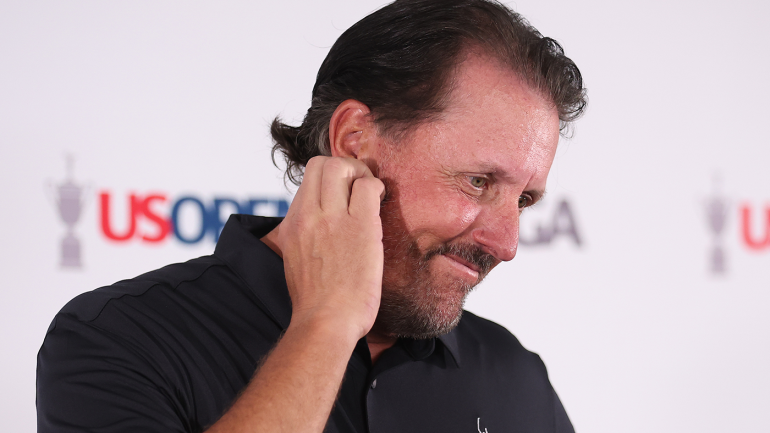
Since golf restarted amid the COVID-19 pandemic exactly two years ago, there have been plenty of unbelievable moments. But the most stunning of all -- the one that would have seemed almost unfathomable at any point over the last 30 years -- took place during a quiet Monday afternoon, coincidentally just miles from ground zero of perhaps the biggest rebellion in post-reformation world history.
Phil Mickelson -- one of the most decorated champions and greatest characters in the modern sports era and someone who has always treated pride and competitiveness as a currency in which he deals -- appeared ashamed of himself.
Mickelson stumbled his way through an array of questions during his U.S. Open press conference at The Country Club on Monday, offering rote answers and half-truths about his present situation and future plans.
Even though he spoke for 30 minutes and uttered nearly 3,000 words, he said nothing meaningful.
A must-see pre-major championship press conferences somehow became increasingly difficult to watch.
Why, though?
Mickelson himself perhaps provided that answer when he was asked why he ran the risk of being banned by the PGA Tour so he could join LIV Golf recently. Why did he trade competition for exhibition? Why did he reportedly help write the operating agreement for a league funded by the government of Saudi Arabia, which seems even less concerned with a business plan than the start-ups to which it has often been compared?
"I think that there's an obvious incredible financial commitment," said Mickelson.
He could have stopped there but decided to continue.
"But more than that -- for all the players involved and everyone involved ... there are other factors that with fewer tournaments, it allows me to have more balance in my life. It allows me to do things that are off the golf course I've always wanted to do."
Some of this is perhaps true -- definitely the first part -- but Mickelson delivered it with the conviction and confidence of his statue that sits in the World Golf Hall of Fame.
Probably could have ended the answer after the first nine words. pic.twitter.com/UIlayZnt5H
— Adam Silverstein (@SilversteinAdam) June 13, 2022
Lefty didn't even appear to believe what he was saying. He put a price on his pride as a competitor and an athlete, and somebody bought it for the purpose of wielding his name, image and likeness for their own ambitions. If these are the media rights that so rankled Mickelson, let's hope he priced them high enough.
That price tag was surely high, reportedly $200 million for somebody who has undoubtedly made at least twice that over the last three decades. The going rate for one of the 10 best players in golf history to box up what he's always loved about the sport and ship it to somebody who apparently needs it more than he does.
Perhaps Lefty believes he'll still be afforded the ability to compete at the highest level at major championships, but the man who spoke Monday had the look of somebody who didn't care whether it was true.
It wasn't supposed to be this way. The focus on Mickelson as he enters the U.S. Open every year should be the tussle with his white whale. We should instead be discussing how the site famous for producing one of the youngest champions in 122 years of the U.S. Open could become even more renowned were it to deliver the oldest major winner in history his career grand slam at long last.
Instead, Mickelson walked to the microphone with the hangdog look of a man who traded something he didn't want to lose for something he'll never be able to keep. Gone was the bravado that has become as much a a part of who he is as any shot shape or on-course strategy he's deployed over the years. This moment in time was bereft of a man who has always desired to be at the center of the golf universe.
Instead, Mickelson looked as if he'd rather be almost anywhere else.
"Any decision that you make in your life that's purely for money usually doesn't end up going the right way," said Rory McIlroy, perhaps presciently, last week. "Obviously, money is a deciding factor in a lot of things in this world, but if it's purely for money ... it never seems to go the way you want it to."
That reality seems to have come to bear in Mickelson's life.
French theologian John Calvin once wrote that "man's nature is a perpetual factory of idols. The mind begets an idol, and the hand gives it birth." Whether Mickelson, when he took his talents to LIV Golf Investments, was in desperate need of money (like many have reported) or simply desired $200 million to add to his coffers is unknown. However, what's obvious is the cost of being the de facto spokesman for a sham league seems to be a burden he is carrying.
It's extremely difficult to square the man we watched Monday with the man who won the PGA Championship at Kiawah Island last May. Here's what Mickelson said after that absurd victory over Brooks Koepka and Louis Oosthuizen, which doubled as one of the greatest weekends ever in golf.
"My desire to play is the same," he said. "I've never been driven by exterior things. I've always been intrinsically motivated because I love to compete. I love playing the game. I love having opportunities to play against the best at the highest level. That's what drives me, and I think that that's what is -- the belief that I could still do it inspired me to work harder.
"I just didn't see why it couldn't be done. It just took a little bit more effort."
Here's the thing: Mickelson wasn't being disingenuous, nor was he weaving a tale for the purposes of placating the media. The logic goes like this: You absolutely cannot win a major championship in this era as a 50-year-old man unless your desire to compete and your pride in being a champion is comically high.
Mickelson was always the silent assassin Tiger Woods never purported himself to be. While Tiger visually showed you the exact way he wanted to render you unconscious, Mickelson moved in silence but had no less desire to carve up PGA Tour fields using his 3-iron as a scalpel than the 15-time major winner to whom he's always been compared. Lefty may have held a thumb out for the public to ogle, but it was always a cloak for his other hand, which held a middle finger to his competitors behind his back.
There is more logic to be found here. Lesser champions than Lefty might appear less shameful over their decisions because they never had it in them to be the once-proud contender Mickelson has proven to be.
Lefty has turned a lot of would-be stans against him in recent days. From his comments about "scary motherf---ers" to the ongoing war he has in which McIlroy and Justin Thomas are ostensibly his opponents, he has become the villain many always believed him to be.
The saddest part of it all is that the competitor inside of him is crushed by this in a way the likes of Bryson DeChambeau would never understand. There's a difference between being great at golf and giving your heart to the sport. DeChambeau is the former; Mickelson is very much the latter. But as Will Knights pointed out, even Mickelson might be rooting against himself at this point.
No one knows what Lefty is feeling internally, but it's obvious what we saw Monday: a man ashamed of his choices, ashamed of the position in which he's put himself and the sport.
He was asked how he would explain his position to 9/11 Families United, which has spoken out against this Saudi Arabia-backed league. While he offered empathy and then sympathy, he provided no actual answer to the question.
Mickelson's made some absolutely correct points -- many of them, in fact -- about the PGA Tour and professional golf as a whole, but he sure doesn't seem proud of how he's gone about implementing his plan.
Perhaps behind the scenes, this is not true. Perhaps he's been yukking it up and carrying himself like the gregarious, hustling great he's always been. That certainly wouldn't square with the man who held court (if you can call it that) in the first press conference of this 2022 U.S. Open. The man who looked like a silhouette of his once-proud self, more a cardboard cut out than the larger-than-life character he's been from his first day on the PGA Tour.
There are several lessons to be learned here. Though someone's services can be bought and sold, you can't commercialize the inner being. The emotions of the heart do not deal in economics.
Mickelson is reportedly once again "private jet" rich, but the price he paid to get there was exorbitant.
What's been missed along the way as the LIV Golf-PGA Tour war has played out in recent days is this: Though there are plenty of things money can buy, there are many more important things it cannot.
The problem for Mickelson? The richer one becomes and the more idols one's heart creates, the harder it is to tell the difference.
![[object Object] Logo](https://sportshub.cbsistatic.com/i/2020/04/22/e9ceb731-8b3f-4c60-98fe-090ab66a2997/screen-shot-2020-04-22-at-11-04-56-am.png)







